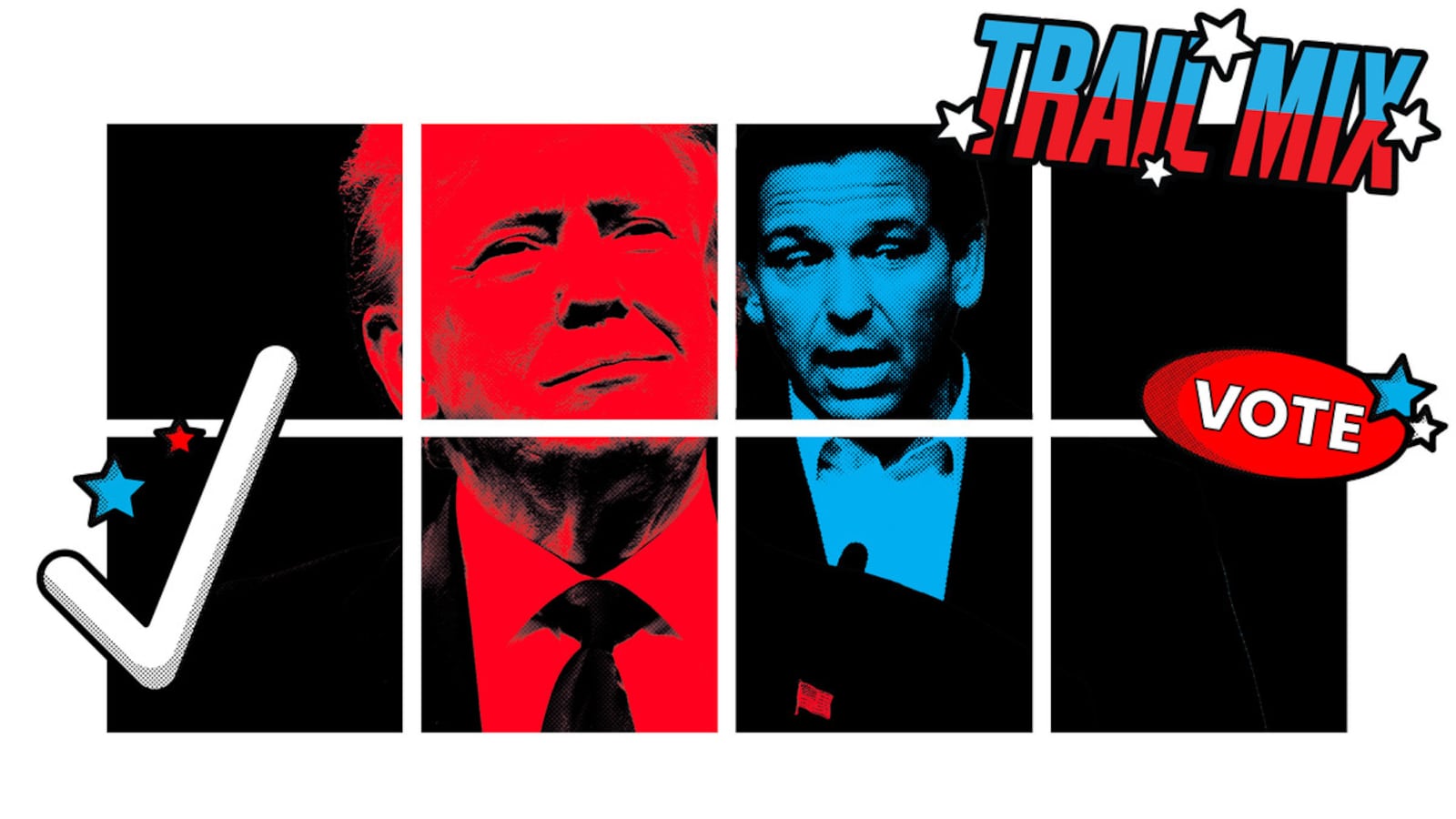Welcome to Trail Mix, a fun but nutritious snack for your election news diet. See something interesting on the trail? Email me at jake.lahut@thedailybeast.com.
This week, we dive into the disappearance of the typical primary campaign structure. Plus, a 2024 prediction from Sen. John Fetterman, and an exclusive interview with GOP presidential hopeful Doug Burgum following his pre-debate Achilles injury.
“Billable hours.” Among presidential primary veterans in the early states of Iowa and New Hampshire, this year’s crop of GOP campaign staffers are increasingly referred to in shorthand—by the cities from which they fly in.
A group of staffers from the pro-Ron DeSantis PAC, Never Back Down? “Atlanta,” sighed a seasoned New Hampshire campaign operative.
For other DeSantis operatives, it’s Tallahassee. For Nikki Haley’s team, it’s Charleston. For Donald Trump, it’s Mar-a-Lago or Bedminster. For everyone else, it’s D.C., or the Beltway.
The phenomenon is a big reason why the 2024 campaign trail feels upside down to so many seasoned operatives. Typically, presidential campaigns stand up sizable staff organizations in the key early states, which tend to heavily feature in-state talent.
But with the GOP primary reaching a critical juncture, many presidential campaigns have vanishingly few paid staffers on the ground in New Hampshire and Iowa.
Instead, deep-pocketed outside groups, such as DeSantis’ PAC, are increasingly taking on the tasks the campaigns themselves always have, like hiring and paying staff to organize key primary states.
“When Never Back Down is hosting events for DeSantis, they’re also flying in 15, 20 people from Atlanta and Tallahassee,” said the New Hampshire Republican, who is a DeSantis supporter.
These operatives’ priorities, say local campaign insiders, might be a little different from the traditional campaign staffer. “They’re all about billable hours,” the Republican said.
Another longtime New Hampshire Republican campaign adviser recalled a recent meeting in which a man who initially said he was representing one of the presidential campaigns later clarified he was prohibited from speaking with the candidate or the campaign because “I’m with the PAC.”
“I have never seen it like this,” the adviser told The Daily Beast.
Throughout the 2024 campaign, news outlets have teased out several of the strange implications of the PAC-dominated strategy, which allows candidates to attempt to skirt campaign finance limits. One that seems to have gone unnoticed is the disappearance of the traditional state-based campaign operation.
In New Hampshire, the DeSantis campaign has only Michael Gorecki, their state director, who has been told he is not authorized to hire anyone in the state, according to three Republicans familiar with the conversations. The DeSantis campaign, and Never Back Down, did not respond to requests for comment. After publication, a DeSantis spokesperson said the campaign has a second paid staffer in New Hampshire, senior adviser Ethan Zorfus.
Mike Pence, meanwhile, does not have a formal state director in either Iowa or New Hampshire, though he does have a paid staffer in each state to coordinate relationships. Vivek Ramaswamy has two former Trump aides on the payroll running his New Hampshire campaign; it’s unclear if he is employing anyone in Iowa.
The Chris Christie campaign has yet to announce a formal state director in either Iowa or New Hampshire, but the first New Hampshire Republican credited Christie for giving lots of face time to the voters and keeping his national team engaged.
Trump has filled more top early state jobs—he has state directors in Iowa and New Hampshire—but he is also relying heavily on an unusual field staff structure driven by unpaid volunteers.
In any case, the staffing levels are a stark departure from the 2016 primary, in which Jeb Bush had a team of more than 20 paid staffers in New Hampshire by December 2015, while the likes of John Kasich and Marco Rubio had 11 and seven, respectively.
With Trump overwhelmingly favored to win the primary, it’s unclear how much of an impact these unorthodox staffing practices will have on the outcome of the early state races. Some of these candidates might not have the resources to staff up, even if they wanted to.
Still, campaign veterans worry that this cycle may have given rise to a new, and worse, playbook for primary campaigning.
Traditionally, a state director and their staff would field invites to events big and small, from county fairs to fundraisers. They also serve as the face of the campaign on the ground, handling grievances and putting local bigwigs in touch with the right people on the national campaign.
The staffers outsourced to political action committees, meanwhile, are not trusted faces from past statewide campaigns, and often reveal telltale signs of being from out-of-state.
“Nobody wants to talk to someone with a Massachusetts accent, much less someone from way out of state,” a longtime New Hampshire Republican operative told The Daily Beast. “You can smell them from a mile away.”
When Never Back Down comes to town, the face of the DeSantis campaign usually comes in the form of a twentysomething staffer, tasked with approaching town and county-level GOP committees while wearing jeans, T-shirts, and “sneakers with holes in them,” as described by the New Hampshire Republican.
At this stage of the primary, if someone mentions Atlanta or Tallahassee in a crowd of New Hampshire campaign insiders, eyes inevitably begin to roll.
“When you do an event with any of these morons, they don’t know how to deal with the local voters,” the New Hampshire Republican said. “What does it do? It makes the people who are there to talk to him as voters feel like they’re not important.”
Return to Oz? Senate Republicans appear to have scored a win in Pennsylvania: On Tuesday, Reuters reported that ultra-wealthy hedge funder David McCormick—whom GOP brass heavily recruited to challenge Sen. Bob Casey (D-PA)—will launch his campaign this fall.
The news solidifies Pennsylvania’s status as one of the three or four decisive Senate races in 2024. When the state’s other Democratic senator heard about McCormick’s plans, however, he was positively giddy.
In an interview with reporters in his Capitol Hill office on Tuesday, Sen. John Fetterman sarcastically said he was “devastated” that McCormick will run. “This is not swagger or anything like that,” he said. “I genuinely believe Bob Casey is going to beat the brakes off him.”
In 2022, Fetterman would have faced McCormick, who spent millions of his own money on his campaign, if he had not narrowly lost to TV doctor Mehmet Oz in the GOP primary. In the general election, Fetterman mercilessly tagged Oz—who lived in New Jersey—as an out-of-touch carpetbagger.
The senator is eager to run the same play against McCormick, who made his fortune at a Connecticut-based firm and still owns homes in that state. “I love the Oz connection,” Fetterman said.
National Republicans see McCormick as a much stronger candidate than the slick and pandering Oz. Fetterman doesn’t. Asked what differences he sees between the two, the senator had a simple answer: “Jesus—money,” he said. “That’s all he has going for him.”
Achilles Doug. For a man who spent more than $10 million of his own money running for president only to have torn his Achilles tendon playing basketball before the big first debate, North Dakota Gov. Doug Burgum sounds surprisingly upbeat about the whole ordeal.
In a phone interview with The Daily Beast on Thursday, Burgum opened up about the pre-debate injury on the basketball court.
“The skies were clear, but it was raining threes,” Burgum said of the pickup game of basketball he played with his staff on the morning of the Aug. 24 debate in Milwaukee, Wisconsin.
The North Dakota governor said he “was trying to break somebody else's ankles and I ended up blowing my own Achilles,” putting just too much side-to-side movement on his left leg.
Since then, Burgum said he’s seen three doctors—including a physician for the NBA’s Milwaukee Bucks—who all told him the tear was too high up on his tendon to justify going to surgery. “My toe is down about 20 degrees” in a cast, Burgum said, “so the Achilles is touching the calf.”
It might have been raining threes on the court, but Burgum struggled to land a slam-dunk moment on the debate stage after his injury, with Ramaswamy claiming most of the attention as the breakout candidate.
Hoping for another shot, Burgum is working to make the next debate on Sep. 28. But he still needs a higher national polling average to qualify.
Nevertheless, he previewed some possible lines of attack for that debate with The Daily Beast, suggesting he might pick a fight with Ramaswamy over their respective business records. (Burgum made hundreds of millions of dollars selling his software company in 2001.) The governor insisted he is “happy to mix it up” with other opponents on stage.
But the basketball court is another story—at least for the next two to three months, as Burgum’s injury heals well enough for him to lose his cast.
“I mean,” Burgum said, “I think Kevin Durant didn’t get back to full speed for 12 months before he got back in the NBA.”
Off the Beaten Path
VivekTok. After initially saying he wouldn’t join TikTok over security concerns stemming from its Chinese ownership, Ramaswamy is now signed up and on board after a dinner with social media influencer and boxer Jake Paul on Sunday.
“Put him down as a maybe.” Pence got heckled at a diner in Iowa on Tuesday, which has become a consistent trend in his campaign. In this case, an unidentified man told Pence to “get the fuck out of our country and get the fuck out of Iowa.” Pence’s quick response earned more than a few chuckles.
Yang’s Labels. Former 2020 Democratic presidential and New York mayoral candidate Andrew Yang said he’s “had conversations with various folks who are associated with No Labels,” the big-money centrist group eyeing a third-party bid in 2024 if the country gets a Biden-Trump rematch. Yang described himself as an “anyone-but-Trump guy,” and that he wouldn’t mount a run if it would be “counterproductive, or if it would increase the chances of someone like Donald Trump becoming president again,” he said in an interview with Politico. Yang did not return a request for comment from The Daily Beast about his potential plans.
Campaign lit
Tim Scott’s girlfriend. The Washington Post’s Ben Terris finally gets an answer—sort of—to a lingering question looming over the lone bachelor in the 2024 presidential race.
‘Self-inflicted wound.’ Our Sam Brodey broke news on Thursday with fresh worries from within the House GOP about impeaching President Biden.
‘Ghost’ to guv? Once again, our Roger Sollenberger has new details about rising Kentucky GOP governor candidate Daniel Cameron and his dysfunctional attorney general’s office.
Mitt lets it rip. Just as Sen. Mitt Romney (R-UT) announced he won’t seek re-election, The Atlantic’s McKay Coppins dropped an excerpt from his new Romney biography, in which the GOP elder statesman delivers harsh assessments of his colleagues.
Sam Brodey contributed to this report.










